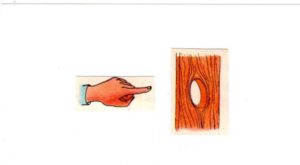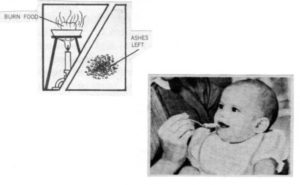January 15th, 2020 · 2 Comments
A few entries on logic and rhetoric, from the Scat Noir Encyclopaedia.
ALLITERATIVE METONYMY: A rhetorical device in which a noun is replaced by an associated noun beginning with the same letter; for example: It’s a digestion eat digestion world.
ANAPHORIC APOSTROPHE: A rhetorical device in which a person not present is addressed repeatedly; for example: “O ancestors! O ancestors! O ancestors! O ancestors! O ancestors!”
AUTOSIMILE: A rhetorical device in which something is compared to itself; for example: The sea is as vast as the sea.
HYPERBOLIC LITOTES: A rhetorical device combining overstatement and understatement; for example: It was not too overwhelmingly magnificent.
OXYMORONIC ONOMATOPOEIA: A rhetorical device using a contradictory sound; for example: The bell tolled with a loud pfft.
POLYSYNDETONIC ELLIPSIS: A rhetorical device in which all words are omitted except conjunctions; for example: And or and and.
QUADRATIC SYLLOGISM: A syllogism containing four propositions. The first figure has three premises and one conclusion: All men are mortal; Socrates is a man; Some men have beards; Therefore, Socrates is mortal and may have a beard. The second figure has two premises and two conclusions: All dogs are mammals; All dachshunds are dogs; Therefore, all dachshunds are mammals; Also therefore; some mammals are not dachshunds. The third figure has one premise and three conclusions: Socrates is a man; Therefore, Socrates is not all men; Also therefore, Socrates is not a non-man; Also therefore, Socrates is not all non-men.
SCOTSMAN: No true Scotsman invokes “no true Scotsman.”
TAUTOLOGICAL SYLLOGISM: A syllogism containing only one term. For example: Socrates is Socrates; Socrates is Socrates; Therefore, Socrates is Socrates.
UNCATEGORICAL COPULA: The uncategorical copula replaces the affirmative or negative copula in an uncategorical premise; for example: X is sort of Y; X could be Y; X should be Y; X is not Y, but will do in a pinch; X will be Y when it hatches; X was Y before I broke it; X is Y except for that part on top.
Tags: *Words · L
January 5th, 2020 · Comments Off on Index Cards (94)
Tags: *Index Cards
December 23rd, 2019 · 2 Comments
Here’s another example of a classic work of literature nipped in the bud. Potions are often unpalatable! This too appeared in the latest issue of the Black Scat Review.
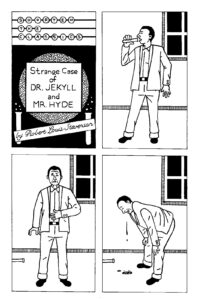
Tags: *Cartoons · S
December 15th, 2019 · 1 Comment
This description of an artificial auxiliary language, which I hope is fictional, was one of my contributions to the Scat Noir Encyclopaedia. This book is still available from Amazon, and provides ample entertainment and instruction.
HOOHOO: Hoohoo is an artificial auxiliary language, developed by Dr. Ernst Babner in the early twentieth century.
Dr. Babner, a professor of religious studies in Zurich, first outlined his creation in the 1924 pamphlet Before Babel: Pre-Articulate Commonality, followed by the 1926 treatise Hoohoo: The Natural Universal Language. He argued that all language derived from animal cries, common to all cultures, and that the most feasible universal language was one based on that vocabulary.
He began with using instinctive human vocalizations, such as laughter, weeping, cooing, whimpering, snorting, and yelling, to express the corresponding emotions. He added imitations of animals and the sounds of nature, to express ideas related to them: the howl of a wolf meant “hunger,” the oinking of a pig “satiety,” the blowing of the wind “cold.” He argued that, unlike most a posteriori constructed languages, Hoohoo was free of cultural bias, easily accessible to all.
His public demonstrations, in which he stood gravely at a lectern, making barnyard noises, were met with gales of laughter, but produced few converts. A few meetings were held, only to be cheerfully mocked by the press. Critics also pointed out that Hoohoo was incapable of abstraction, being effectively limited to discussing bodily functions, and that the written language was virtually incomprehensible. Today, Hoohoo is only spoken by a few devotees of constructed languages.
Tags: *Words · H
December 8th, 2019 · 2 Comments
Here’s a translation of a song by Charle Cros, from Black Scat Review 18.
SONG OF THE SCULPTORS
(Charles Cros, 1879)
Proclaim the principles of art!
And shout with all your might!
That marble is a stone apart,
Because it is so white.
Proclaim the principles of art!
And fix them in your head!
Like lobsters ordered à la carte,
When clay is cooked it’s red.
Proclaim the principles of art!
Be joyful and amused!
For bronze, according to the chart,
In bells is what is used.
Proclaim the principles of art!
Drink all that you can hold!
Though plaster may not look too smart,
It sets well in the mold.
Proclaim the principles of art!
The lesson is complete!
Though curvy women charm the heart,
They’re only fat and meat.
Tags: *Words · S
December 1st, 2019 · 2 Comments
A three-part round. Everyone wants to be remembered.

Tags: *Music · R
November 17th, 2019 · Comments Off on Black Scat Review 18
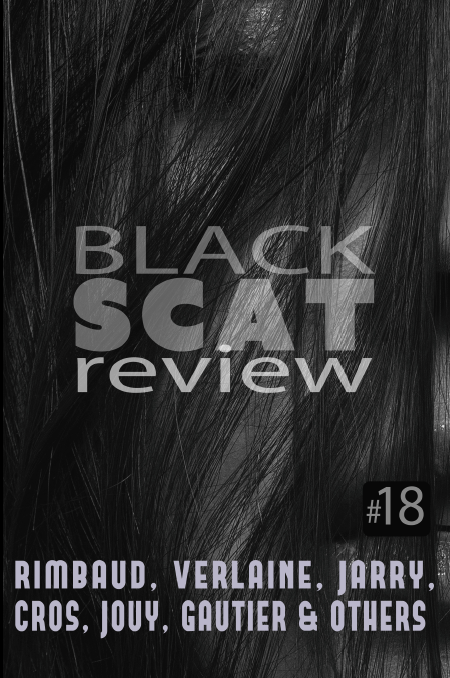
Black Scat Review #18 is now available! This jam-packed issue contains four pages of my comic strip “Shorten the Classics,” an excerpt from my translation of Alfred Jarry’s play The Pope’s Mustard-Maker, and my translations of poems by Charles Cros, Jules Jouy, and Laurent Tailhade.
You will also find contributions by Mark Axelrod, Angela Buck, Peter Cherches, Catherine D’Avis, Farewell Debut, Eckhard Gerdes, Bob Heman, Charles Holdefer, Rhys Hughes, Esteban Isnardi, Harold Jaffe, Alexander Krivitskiy, Olchar E. Lindsann, Joel Lipman, Laura Mazzenga, Jim McMenamin, Peter McAdam, Doug Rice, Jason E. Rolfe, Paul Rosheim, Gregory Wallace, and Tom Whalen, as well as posthumous offerings from Gautier, Rimbaud, and Verlaine. It’s all edited and designed by Norman Conquest of Black Scat Books, and available from Amazon.
Tags: *Cartoons · *Words · B
November 12th, 2019 · 2 Comments
Here’s an example of my comic strip “Shorten the Classics,” one of four for an upcoming issue of the Black Scat Review. This version of “The Raven” not only makes it more concise, but gives it a happier ending. Please click on it to make it more legible.
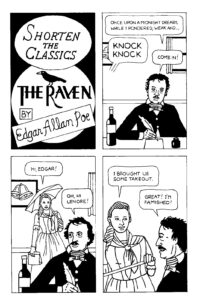
Tags: *Cartoons · S
November 3rd, 2019 · Comments Off on Index Cards (93)
Tags: *Index Cards
October 31st, 2019 · Comments Off on Hansel and Gretel and I
This retelling of the classic tale can be found in my book The Doug Skinner Dossier. Both Hansel and Gretel are based closely on my sister. Here’s how it begins.
HANSEL AND GRETEL AND I
Hansel and Gretel and I lived with our father and evil stepmother in a little bungalow out near the forest. Our mother was eaten by a bear when we were very young. Our father had remarried, and our evil stepmother made life difficult for us. She tried to poison our apples, but we only sickened. She encouraged us to play with bear cubs, but they ran away. She sometimes threw knives at us, claiming that her hand had slipped. Our father was busy making cuckoo clocks, and was oblivious to all of this. He was in a world of his own.
One sunny morning, our evil stepmother led us into the darkest and thickest part of the forest, gave us each a lunchbox, and ran away cackling.
“She’s abandoning us here,” I said.
“No she’s not,” said Gretel.
“She’ll be back,” said Hansel.
“She’s an evil stepmother,” I pointed out.
“We know she’s an evil stepmother,” snapped Gretel. “We don’t have to talk about it.”
“You only see the negative side of things,” added Hansel.
“But she keeps trying to kill us,” I said.
“No she doesn’t,” said Hansel.
“She throws knives at us,” I said.
“She told us that her hand slipped,” said Gretel.
“It’s wrong to accuse people of lying,” said Hansel.
“Besides,” said Gretel, “Mama is an angel in heaven now. She’ll watch over us.”
“That’s not how it works,” I said.
Gretel gazed upward, her eyes pearling with tears. “I miss you, Mama,” she whispered.
“She died when you were a year old,” I said. “You can’t possibly remember her.”
“Some people remember better than others,” Gretel archly replied…
Tags: *Words · H

